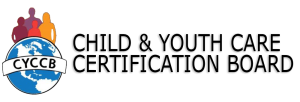I. Professionalism
Professional practitioners are generative and flexible; they are self-directed and have a high degree of personal initiative. Their performance is consistently reliable. They function effectively both independently and as a team member. Professional practitioners are knowledgeable about what constitutes a profession, and engage in professional and personal development and self-care. The professional practitioner is aware of the function of professional ethics and uses professional ethics to guide and enhance practice and advocates effectively for children, youth, families, and the profession.
A. Foundational Knowledge
- History, structure, organization of child and youth care
- Resources and activities of child and youth care
- Current and emergent trends in society, services, and in child and youth care
- Structure and function of codes of ethics applicable to practice which includes the Standards for Practice of North American Child and Youth Care Professionals
- Accepted boundaries in professional practice
- Stress management and wellness practices
- Strategies to build a professional support network
- Significance of advocacy and an array of advocacy strategies
- Relevant laws, regulations, legal rights and licensing procedures governing practice
B. Professional Competencies
- Awareness of the profession
- access the professional literature
- access information about local and national professional activities
- stay informed about current professional issues, future trends and challenges in one’s area of special interest
- contribute to the ongoing development of the field
- Professional development and behavior
- Value orientation
- state personal and professional values and their implications for practice including how personal and professional beliefs values and attitudes influence interactions
- state a philosophy of practice that provides guiding principles for the design, delivery, and management of services
- Reflection on one’s practice and performance
- evaluate own performance to identify needs for professional growth
- give and receive constructive feedback
- Performance of organizational duties
- demonstrate productive work habits
- know and conform to workplace expectations relating to attendance, punctuality, sick and vacation time, and workload management
- personal appearance and behavior reflect an awareness of self as a professional as well as a representative of the organization
- demonstrate productive work habits
- Professional boundaries
- recognize and assess own needs and feelings and keeps them in perspective when professionally engaged
- model appropriate interpersonal boundaries
- Staying current
- keep up-to-date with developments in foundational and specialized areas of expertise
- identify and participate in education and training opportunities
- Value orientation
- Personal Development and Self Care
- Self awareness
- recognize personal strengths and limitations, feelings and needs
- separate personal from professional issues
- Self care
- incorporate ‘wellness’ practices into own lifestyle
- practices stress management
- build and use a support network
- Self awareness
- Professional Ethics
- describe the functions of professional ethics
- apply the process of ethical decision making in a proactive manner
- integrate specific principles and standards from relevant code of ethics to specific professional problems
- carries out work tasks in a way that conforms to professional ethical principles and standards
- Awareness of Law and Regulations
- access and apply relevant local, state/provincial and federal laws, licensing regulations and public policy
- describe the legal responsibility for reporting child abuse and neglect and the consequences of failure to report
- describe the meaning of informed consent and its application to a specific practice setting
- use the proper procedures for reporting and correcting non-compliance
- Advocacy
- demonstrate knowledge and skills in use of advocacy
- access information on the rights of children, youth and families including the United Nations Convention on the Rights of the Child
- describe the rights of children youth and families in relevant settings and systems advocate for the rights of children, youth, and families in relevant settings and systems
- describe and advocate for safeguards for protection from abuse including institutional abuse
- describe and advocate for safeguards for protection from abuse including organizational or workplace abuse
- advocate for protection of children from systemic abuse, mistreatment, and exploitation
